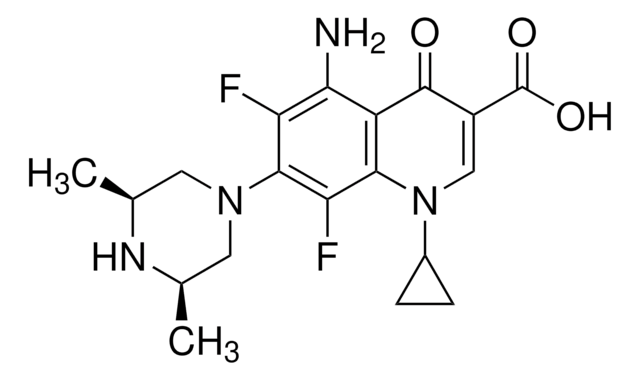17849
Enrofloxacin
≥99.0%
Sinónimos:
Baytril
About This Item
Productos recomendados
Quality Level
assay
≥99.0%
99.0-101.0% (dried substance)
form
powder or crystals
antibiotic activity spectrum
Gram-negative bacteria
Gram-positive bacteria
mode of action
DNA synthesis | interferes
enzyme | inhibits
SMILES string
CCN1CCN(CC1)c2cc3N(C=C(C(O)=O)C(=O)c3cc2F)C4CC4
InChI
1S/C19H22FN3O3/c1-2-21-5-7-22(8-6-21)17-10-16-13(9-15(17)20)18(24)14(19(25)26)11-23(16)12-3-4-12/h9-12H,2-8H2,1H3,(H,25,26)
Inchi Key
SPFYMRJSYKOXGV-UHFFFAOYSA-N
¿Está buscando productos similares? Visita Guía de comparación de productos
General description
Application
- to investigate the pathological mechanisms resulting from the toxicity of fluoroquinolones in mammalian cells
- to prepare a standard solution with 50% acetonitrile in a study to analyze illegal fish drugs used in aquaculture by employing surface-enhanced Raman spectroscopy (SERS)
- as an analyte in a chemiluminescence reagent system
signalword
Danger
hcodes
Hazard Classifications
Acute Tox. 4 Oral - Resp. Sens. 1 - Skin Sens. 1
Storage Class
11 - Combustible Solids
wgk_germany
WGK 3
ppe
Eyeshields, Gloves, type N95 (US)
Elija entre una de las versiones más recientes:
Certificados de análisis (COA)
¿No ve la versión correcta?
Si necesita una versión concreta, puede buscar un certificado específico por el número de lote.
¿Ya tiene este producto?
Encuentre la documentación para los productos que ha comprado recientemente en la Biblioteca de documentos.
Los clientes también vieron
Nuestro equipo de científicos tiene experiencia en todas las áreas de investigación: Ciencias de la vida, Ciencia de los materiales, Síntesis química, Cromatografía, Analítica y muchas otras.
Póngase en contacto con el Servicio técnico













